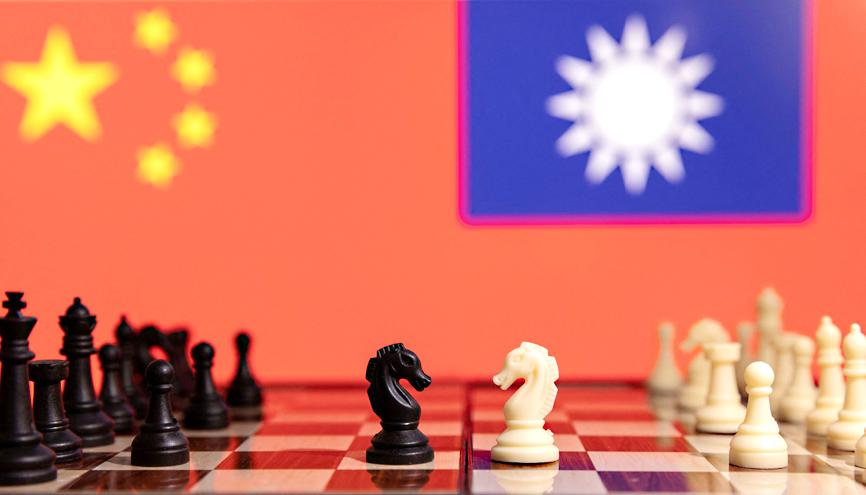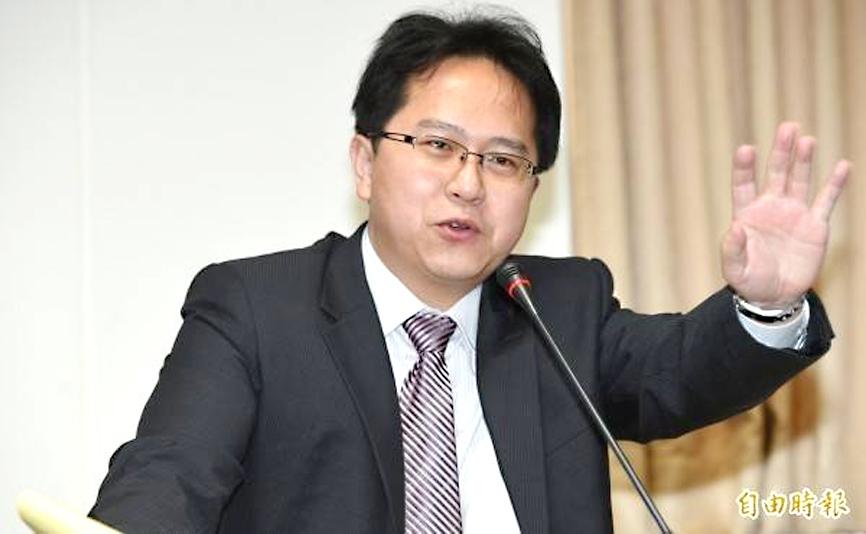Legislators have proposed amending the Anti-Infiltration Act (反滲透法) so that political parties found to have colluded with an enemy state to affect the outcome of an election can be dissolved.
The preamble of a draft amendment proposed by Democratic Progressive Party (DPP) Legislator Chiu Chih-wei (邱志偉) cited the UK’s MI5 security service as last year saying that Beijing has used Chinese agents to infiltrate all major British political parties, and was “engaging in political interference activities through donation of funds to influence policies on China.”
Australia has raised the alarm regarding similar activities.

Photo: Reuters
Under the Anti-Infiltration Act, political parties that have colluded with an enemy state to interfere in the outcome of an election can only be fined.
Chiu said that the Constitutional Court has the authority to order “the dissolution of unconstitutional political parties” if their goals or activities could endanger the nation’s existence and undermine the democratic constitutional order.
He cited Item 5 of Article 5 in the Additional Articles of the Constitution, Article 77 of the Constitutional Court Procedure Act (憲法訴訟法) and Article 26 of the Political Parties Act (政黨法).

Photo: Chung Li-hua, Taipei Times
Merely imposing fines would not deter a political party from colluding with an enemy state, so the Anti-Infiltration Act should be amended to include judgements by the Constitutional Court regarding the dissolution of a political party, Chiu said.
In related developments, the Ministry of the Interior has proposed amending the Political Parties Act so that a party can be dissolved if any of its members are found guilty of contravening either the National Security Act (國家安全法) or the Organized Crime Prevention Act (組織犯罪防制條例).
The ministry proposed the amendment after the China Unification Promotion Party (CUPP), founded by Chang An-le (張安樂), announced last year that it had established a “red squad” to advocate for unification with China and launch an armed insurrection.
However, lawmakers’ reactions varied, with some supporting severe penalties for those who contravene the National Security Act, while others said it could infringe on people’s right to form political parties and organizations, as granted under the Constitution.
Executive Yuan officials said further review would be needed, as the proposal would affect other legislation.
Chang was later charged with contravening the National Security Act. He was summoned for questioning by the High Prosecutors’ Office in March last year.
The case was transferred to the Taipei District Prosecutors’ Office, which dropped the charges in December last year, citing “insufficient evidence.”
Additional reporting by Jason Pan

DEFENDING DEMOCRACY: Taiwan shares the same values as those that fought in WWII, and nations must unite to halt the expansion of a new authoritarian bloc, Lai said The government yesterday held a commemoration ceremony for Victory in Europe (V-E) Day, joining the rest of the world for the first time to mark the anniversary of the end of World War II in Europe. Taiwan honoring V-E Day signifies “our growing connections with the international community,” President William Lai (賴清德) said at a reception in Taipei on the 80th anniversary of V-E Day. One of the major lessons of World War II is that “authoritarianism and aggression lead only to slaughter, tragedy and greater inequality,” Lai said. Even more importantly, the war also taught people that “those who cherish peace cannot

STEADFAST FRIEND: The bills encourage increased Taiwan-US engagement and address China’s distortion of UN Resolution 2758 to isolate Taiwan internationally The Presidential Office yesterday thanked the US House of Representatives for unanimously passing two Taiwan-related bills highlighting its solid support for Taiwan’s democracy and global participation, and for deepening bilateral relations. One of the bills, the Taiwan Assurance Implementation Act, requires the US Department of State to periodically review its guidelines for engagement with Taiwan, and report to the US Congress on the guidelines and plans to lift self-imposed limitations on US-Taiwan engagement. The other bill is the Taiwan International Solidarity Act, which clarifies that UN Resolution 2758 does not address the issue of the representation of Taiwan or its people in

US Indo-Pacific Commander Admiral Samuel Paparo on Friday expressed concern over the rate at which China is diversifying its military exercises, the Financial Times (FT) reported on Saturday. “The rates of change on the depth and breadth of their exercises is the one non-linear effect that I’ve seen in the last year that wakes me up at night or keeps me up at night,” Paparo was quoted by FT as saying while attending the annual Sedona Forum at the McCain Institute in Arizona. Paparo also expressed concern over the speed with which China was expanding its military. While the US

‘FALLACY’: Xi’s assertions that Taiwan was given to the PRC after WWII confused right and wrong, and were contrary to the facts, the Ministry of Foreign Affairs said The Ministry of Foreign Affairs yesterday called Chinese President Xi Jinping’s (習近平) claim that China historically has sovereignty over Taiwan “deceptive” and “contrary to the facts.” In an article published on Wednesday in the Russian state-run Rossiyskaya Gazeta, Xi said that this year not only marks 80 years since the end of World War II and the founding of the UN, but also “Taiwan’s restoration to China.” “A series of instruments with legal effect under international law, including the Cairo Declaration and the Potsdam Declaration have affirmed China’s sovereignty over Taiwan,” Xi wrote. “The historical and legal fact” of these documents, as well